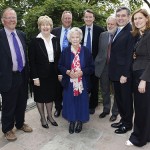Dealing with a new government
With a new government in place, promising cuts in public spending, there may be some sense of deja vu at the OU.
Forty years ago, with the University created by a Labour government but no students yet studying, the election of Ted Heath’s Tory government posed a real threat to the newly formed institution. William van Straubenzee, appointed as junior minister for higher education, reported ‘I would have slit its throat if I could.’ He blamed the outgoing Labour education minister Ted Short for some ‘nifty, last-moment work with the charter that made the OU unkillable’. Student numbers were cut but the University survived.
Nine years later, another Conservative government, this time led by Margaret Thatcher, caused more problems for the OU. In 1980 the University had to cut expenditure by £3.5 million, nine per cent of its 1979 expenditure and the government effectively imposed a 46 per cent increase in the undergraduate tuition fee. Again the University survived, as no doubt it will again, whatever the new government chooses to throw at it.

May 13th, 2010 at 2:44 pm
Although it is heartening to read that the OU will survive, the form the university takes is open to conjecture. Confidence about its future needs to be balanced against a recognition that the reasons for an open university have changed over time. Ralph Smith summarised the initial imperatives thus:
Political willpower, to Prime Ministerial level, played a large part in ensuring the successful launch of the British Open University… there was pressure to provide a second opportunity… pressure to realise the national potential…pragmatic pressure to provide more highly qualified manpower… cheaper than other forms of education and … more flexible approach to changing demands
See Ralph C Smith, ‘Developing distance learning systems – the UKOU experiment: some lessons’, in G. Ram Reddy (ed.), Open universities. The ivory towers thrown open, Oriental Press, London, 1988, pp. 244-245.
The pressures that Smith identified no longer exist. Although David Cameron visited the Digilab in the OU Library at Walton Hall, there is no evidence that, as PM, he is interested in the institution. There are other institutions which provide opportunities for people to have second chances and pressure for qualified people is not exclusively seen in terms of the expansion of higher education. While being inexpensive and flexible are still valued, and while the OU has often performed well in these areas, it has plenty of rivals.
May 13th, 2010 at 3:25 pm
While the OU has survived, intellectual and political developments have perhaps rendered it a different OU to that which was envisaged. Labour’s concept of a mass higher education system, not simply designed to sustain the power of a ruling elite, was reorientated by the Conservatives who favoured neo-liberal enterprise and market competition within higher education. At the same time (and is it just coincidence?) Lyotard’s ‘La condition postmoderne’ was published (1979). In 1984 it was translated into English as ‘The Postmodern Condition: A Report on Knowledge’. One of the effects of the spread of post-modernist critiques was the discrediting both of analyses of education and culture along lines of class and of institutional attempts to make the content of education responsive to the student body’s social and cultural characteristics. This ran counter to the OU’s stated ambition to help students to unfold their own potential for the general benefit of a social democratic society and undermined The Open University that Harold Wilson would have recognised.
May 14th, 2010 at 3:54 pm
The first Vice Chancellor of the OU, Walter Perry recorded that ‘during the life of the Planning Committee the Conservative Party never went on record with any public statement about their attitude to the Open University’. He also noted that Sir Edward Boyle, who spoke for the Tories on education, offered only ‘the mildest attack on the Open University’. This was after Boyle did not offer support for the venture (see Walter Perry, ‘Open University’, Open University Press, pp. 28, 30).
The position of the Conservative Party in relation to the OU was also discussed by Charles A Wedemeyer in an article in the OU’s journal (Charles A Wedemeyer, The birth of the Open University- a postscript’, ‘Teaching at a Distance’, 21 September 1982, pp.21-27).
In 1965 Weyermeyer was consulted by the Conservatives about Wilson’s idea for a ‘University of the Air’. He possibly helped to convince the Tories that it should not be opposed. Even though the Tory Shadow Chancellor, Ian McLeod was quoted in the Daily Telegraph, 17 February, 1969, as referring to the OU as ‘blithering nonsense’ and threatening to scrap it if given the opportunity so to do, in 1982 Wedemeyer concluded that, ‘as things turned out, it does appear that the Tory position regarding the University of the Air cum Open University was not one of either outright opposition or support, but was characterised by restrained criticism.’